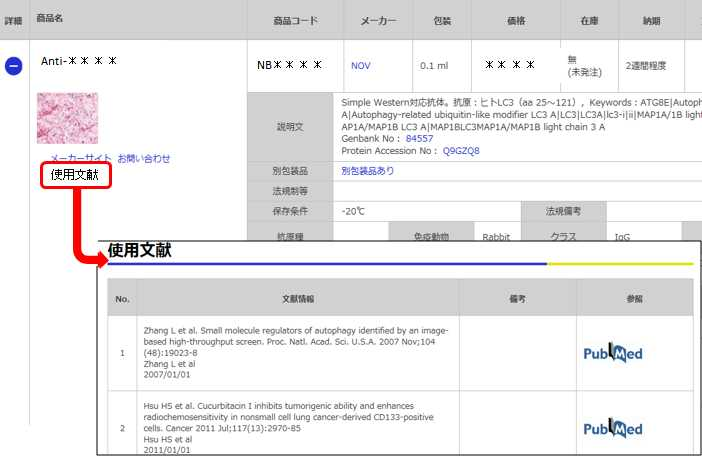抗AKT1 [p Ser473] (104A282)抗体 | Anti-AKT1 [p Ser473] (104A282) Antibody
掲載日情報:2018/07/09 現在Webページ番号:47280
世界最大級の抗体製品数を取り扱うNovus Biologicals社のAKT1 [p Ser473] (104A282)に対する抗体(anti-AKT1 [p Ser473] (104A282) | antibody AKT1 [p Ser473] (104A282))です。Novus Biologicals社の抗体は数多くの学術論文で使用実績があります。
※本製品は研究用です。研究用以外には使用できません。

追加しました。
価格
[在庫・価格 :2026年01月12日 08時35分現在]
| 詳細 | 商品名 |
|
文献数 | ||||||||||||||||||||||||||||||||||||||||||||||||||||||||||||||||||||||||||||||||||
|---|---|---|---|---|---|---|---|---|---|---|---|---|---|---|---|---|---|---|---|---|---|---|---|---|---|---|---|---|---|---|---|---|---|---|---|---|---|---|---|---|---|---|---|---|---|---|---|---|---|---|---|---|---|---|---|---|---|---|---|---|---|---|---|---|---|---|---|---|---|---|---|---|---|---|---|---|---|---|---|---|---|---|---|---|---|
|
Anti-AKT1(pSer473), Phosphorylated, Mouse-Mono(104A282) |
|
11 | |||||||||||||||||||||||||||||||||||||||||||||||||||||||||||||||||||||||||||||||||||
|
|||||||||||||||||||||||||||||||||||||||||||||||||||||||||||||||||||||||||||||||||||||
[在庫・価格 :2026年01月12日 08時35分現在]
Anti-AKT1(pSer473), Phosphorylated, Mouse-Mono(104A282)
文献数: 11
- 商品コード:NB100-56749
- メーカー:NOV
- 包装:0.1mg
- 価格:¥96,000
- 在庫:無(未発注)
- 納期:3~4週間 ※※ 表示されている納期は弊社に在庫がなく、取り寄せた場合の目安納期となります。
- 法規制等:
| 説明文 | レビューあり。旧IMGENEX社 商品コード:IMG-187A,Keywords:AKT|EC 2.7.11|EC 2.7.11.1|PKBMGC99656|PRKBA|Protein kinase B|Proto-oncogene c-Akt|rac protein kinase alpha|RAC-ALPHA|RAC-alpha serine/threonine-protein kinase|RAC-PK-alpha|RACPKB-ALPHA|v-akt murine thymoma viral oncogene homolog 1 クローン:104A282 Genbank No: 207 Protein Accession No: P31749 |
||||||
|---|---|---|---|---|---|---|---|
| 別包装品 | 別包装品あり | ||||||
| 法規制等 | |||||||
| 保存条件 | 法規備考 | ||||||
| 抗原種 | 免疫動物 | Mouse | |||||
| 交差性 | Human/Mouse/Rabbit/Rat | 適用 | IHC,Western Blot | ||||
| 標識 | Unlabeled | 性状 | Protein A/G Affinity Purified | ||||
| 吸収処理 | クラス | IgG | |||||
| クロナリティ | Monoclonal | フォーマット | |||||
| 掲載カタログ |
|
||||||
| 製品記事 | 抗AKT1 [p Ser473] (104A282)抗体 | Anti- AKT1 [p Ser473] (104A282) antibody |
||||||
| 関連記事 | |||||||
追加しました。
Image
追加しました。
Background
Akt, protein kinase B (PKB), is a serine/threonine kinase which is involved in many cellular signaling pathways and acts as a transducer of many functions initiated by growth factor receptors that activat phosphtidylinositol 3-kinase (PI 3-kinase). The major activity of Akt/PKB is to mediate cell survival. Akt/PKB is also believed to be a critical factor in the genesis of cancer as the tumor suppressor PTEN was found to antagonise PI-3 kinase and Akt/PKB kinase activity. Akt/PKB phosphorylation is critical for it activity. The major phosphorylation sites required for Akt activation has been identified as threoinine 308 and serine 473. Serine 473 is phosphorylated by MAPKAP kinase 2.追加しました。
製品情報は掲載時点のものですが、価格表内の価格については随時最新のものに更新されます。お問い合わせいただくタイミングにより製品情報・価格などは変更されている場合があります。
表示価格に、消費税等は含まれていません。一部価格が予告なく変更される場合がありますので、あらかじめご了承下さい。







-Western-Blot-NB100-56749-img0014.jpg)
-Immunohistochemistry-NB100-56749-img0015.jpg)
-Immunohistochemistry-Paraffin-NB100-56749-img0009.jpg)
-Immunohistochemistry-Paraffin-NB100-56749-img0010.jpg)